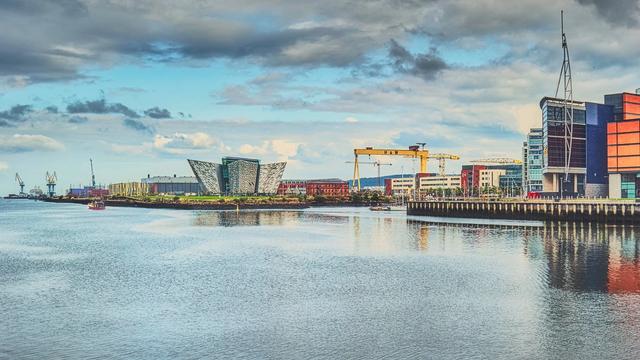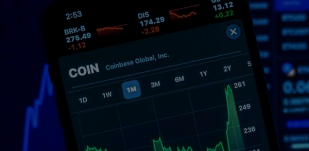Brexit and SMEs: What’s Been Happening and What Lies Ahead?
Reece Dye
Head of Corporate Clients
Do you remember Brexit? You know, that historic political event that dominated column inches and dinner party debates for months on end. At 11pm on 31 January 2020, Britain finally departed from the European Union (EU) more than three and half years after a divisive referendum had set the Brexit wheels in motion by the finest of margins - with parties and protests held in equal measure. The sheer significance of this event – and the seemingly endless negotiation process that preceded it – meant it was widely considered the nation’s biggest challenge of the post-war era. But another even bigger story was beginning to rear its ugly head and it wasn’t long before it sidelined Brexit, causing it to fade into the political background.
Just a few weeks later in March 2020, the Covid-19 pandemic blindsided society, forcing the world into lockdown almost overnight in a bid to control the devastating spread of the virus. Thanks to these enforced restrictions - which have since been lifted in many countries - coupled with the rapid development and rollout of vaccines across the globe, the pandemic has abated.
Understandably, the economic blow dealt by the global health crisis and subsequent recovery remains a focus for small and medium-sized enterprises (SMEs); however, this doesn’t mean the ongoing impact of the UK’s departure from the EU should be brushed under the carpet. Particularly when it comes to trade, which is the lifeblood of many SMEs: international trade is worth over £700 billion for UK SMEs, with the Eurozone representing the UK’s largest trading partner.
Trade agreements
Free-trade deals - primarily in goods but occasionally services as well - aim to encourage trade between countries by making it cheaper. Having been released from EU trading rules, the UK has been busy negotiating its own trade agreements with nations across the globe.
EU and Northern Ireland

The UK's departure from the EU's Single Market and Customs Union was preceded by a last-minute deal on post-Brexit trade and future EU-UK relations that was struck on Christmas Eve 2020 following months of deadlocked negotiations. Crucially, it allows for tariff-free, quota-free access to each other's markets for goods - but not services - and addresses future competition, fishing rights, and cooperation on issues like security.
Known officially as The Trade and Co-operation Agreement, the post-Brexit EU-UK trade deal was officially ratified by the European Parliament in April 2021 having been operating provisionally since January. MEPs voted in favour by 660 votes to 5, while 32 abstained - a key move to ensure that tariff- and quota-free trade continues.
Despite the formal agreements, relations have been strained, with both sides clashing over fishing, diplomatic representation, coronavirus vaccine exports and new arrangements for Northern Ireland. Although part of the UK, Northern Ireland continues to adhere to some EU rules under the Brexit deal to maintain an open land border with the Irish Republic - which is an EU member. However, tensions have arisen over the negotiated protocol setting them out, which is designed to prevent unchecked goods heading into the EU single market via the UK's only land border with the EU to Ireland - in effect creating an internal UK trade barrier with England, Scotland and Wales.
The new barrier has subsequently disrupted supplies from Great Britain, causing anger amongst certain communities in Northern Ireland. Grace periods on the implementation of border checks on goods travelling to Northern Ireland that were extended unilaterally by the British government have since been prolonged indefinitely.
It remains to be seen how much longer London and Brussels will be at loggerheads over the Northern Ireland Protocol. Until an agreement is reached, certain goods travelling between the British Province - which remains in the EU’s customs unions - and the rest of the United Kingdom will be subject to checks.
Use a trusted currency provider
Japan

Britain formally signed a trade agreement with Japan - the world’s third-largest economy - in October 2020. This marked the nation's first big post-Brexit deal, with its other trade agreements largely rolling over from previous EU deals.
The historic agreement means nearly all of the UK’s exports to Japan will be tariff-free while removing British tariffs on Japanese cars by 2026. Then UK International Trade Secretary Liz Truss called it a "ground-breaking, British-shaped deal".
Australia
A free trade agreement between the UK and Australia was announced on 15 June 2021.
Liz Truss described the deal as “historic” and said the “gold-standard agreement shows what the UK is capable of as a sovereign trading nation.” The UK government also believes the agreement will enhance its chances of joining the Comprehensive and Progressive Agreement for Trans-Pacific Partnership (CPTPP) - a free trade agreement between 11 Pacific Rim countries, including Australia.
The agreement scraps tariffs on all UK goods exported to Australia and almost all Australian exports to the UK, subject to ‘rules of origin’. According to the UK government, over £4 billion of UK exports will no longer be subject to tariffs. The agreement also includes trade in services, digital trade and intellectual property.
Trade agreements the UK was already part of
Pre Brexit, the UK was subject to all trade deals the EU had negotiated with another country by default. When the UK departed, the EU had around 40 trade deals covering more than 70 countries. Since then, the UK has negotiated rollover deals with 66 of these countries, including: Canada, Norway, Iceland, Mexico, Singapore, South Korea, and Switzerland.
While talks with other countries are ongoing, the largest agreements have been secured. Existing EU agreements that were not rolled over ended on 31 December 2020, with trade reverting to World Trade Organisation (WTO) terms until a deal could be reached. Trading on WTO terms means importers face tariffs and extra paperwork.
USA

The USA is the UK’s second-largest trade partner, accounting for 9.8% of international trade. However, a trade deal is yet to be agreed by both parties, with negotiations expected to start imminently. Liz Truss said relations with President Joe Biden's administration have been positive and that securing a deal will be a "big opportunity" for Brexit Britain - so, watch this space.
Get free guidance on the currency markets
New operational procedures
The introduction of the Trade and Co-operation Agreement with the EU has spawned a host of new operational procedures for SMEs that rely on international trade to get their head around - from dealing with import VAT and customs declarations to safety and security certificates.
For example, increased paperwork, costs, delays and confusion over rules have been cited as stumbling blocks by SMEs that export goods into the EU. According to a British Chambers of Commerce (BCC) survey, nearly one-third of businesses (30%) surveyed said they found trading more difficult following Britain’s exit from the EU. The main Brexit-related issues highlighted by exporters were increased administration, costs, delays and confusion over what rules to follow. The BCC surveyed 1,000 businesses - most of which were SMEs - with almost half (47%) exporting goods or services to the EU.
According to Adam Marshall, director-general of the BCC: “Trading businesses – and the UK’s chances at a strong economic recovery – are being hit hard by changes at the border. The late agreement of a UK-EU trade deal left businesses in the dark on the detail right until the last minute, so it’s unsurprising to see that so many businesses are now experiencing practical difficulties on the ground as the new arrangements go live.”
While the situation regarding outbound goods at UK ports has been better than the reasonable worst-case scenarios laid out by the government, inconsistency remains in the way customs rules are applied on arrival. For example, early in 2021 it was reported that almost a fifth of British SMEs that export to the EU temporarily halted overseas sales due to the complexity of new customs rules. Since the end of the post-Brexit transition period on 31 December 2020, British businesses selling goods to customers in the EU have been required to fill out customs declarations and other paperwork, causing delays to freight services. Extra costs and paperwork are potentially crippling for UK SMEs who rely on their EU customer base. On the other side of the fence, EU customers will be forced to seek alternatives if it means they can avoid paying import costs.
While British goods being exported to and sold in the EU are not subject to tariffs or quotas, extra administrative costs from form-filling and other checks - so-called ‘non-tariff barriers’ - soon mount up. A notable challenge also arises from “rule of origin” requirements, which restrict the number of foreign components that can be included in goods assembled in Britain for sale elsewhere in Europe.
Looking further ahead, Britain has pushed back its implementation of full post-Brexit borders checks on goods from the EU, after the pandemic, red tape and new immigration rules triggered ongoing supply chain constraints. For example, the confluence of pandemic and Brexit forces have left Britain short of around 90,000 truck drivers, many of whom have returned to eastern Europe, straggling supply chains - most notably in the food and drink sector. Consequently, plans to introduce full controls across areas such as food and animal product importations - which had been due from October 2021 - have been rescheduled to start from January next year under a "pragmatic new timetable", the government announced.
Britain will still implement full customs declarations and controls on 1 January 2022, as planned. However, certification and physical checks on food and animal goods designed to prevent diseases, pests and contaminants - originally scheduled to be introduced on January 1 - will now be introduced in July 2022. Provisions for safety and security declarations will also be delayed until July.
Minister David Frost said: "We want businesses to focus on their recovery from the pandemic rather than have to deal with new requirements at the border, which is why we've set out a pragmatic new timetable for introducing full border controls," adding "Businesses will now have more time to prepare for these controls which will be phased in throughout 2022. We remain on track to deliver new systems, infrastructure and resourcing needed for these controls,"
Top tips for SMEs

These top tips will help your business manage Brexit-fuelled trade headwinds:
- Actively monitor and adjust your cost price if necessary. Previously you may have set an annual cost price; however, in the current environment being dynamic is key. You want to remain competitive price-wise, but at the same time avoid cutting your profit margins.
- Be aware of any increase in shipping costs. Brexit and the pandemic have both impacted the cost of shipping, so do not be caught unaware.
- Formulate a strategy to mitigate your exposure to currency risk. The current trading environment is particularly volatile, so formulating and executing a strategy will not only prevent the risk of currency fluctuations from driving up your costs but also allow for more robust planning for the following year as you understand exactly what profit margins you’re working with.
Choosing a currency specialist
Currencies are traded around the clock - 24 hours a day. Therefore, the value of the pound against other currencies is constantly changing - not just daily but by the minute. Even slight fluctuations can make a big difference to the price of your business’s international payments.
Take the Brexit vote for example: On 23 June 2016, the UK voted to leave the EU - a decision that took markets by surprise. Last-minute polling suggested that ‘remain’ had the edge, so when the Brexit result reverberated around the world the pound fell off a cliff, experiencing its largest intraday collapse in 30 years.
SMEs that operate internationally must do everything in their power to manage this currency market risk. Failure to mitigate these exchange rate fluctuations could result in the cost of vital international payments spiralling out of control, damaging your bottom line. Therefore, choosing a currency specialist is just as important as working with a reputable shipping company that can ensure your goods are exported quickly and safely.
Because every business has a unique set of international payment requirements, there’s no “one size fits all” approach to protecting profit margins from currency market risk. A currency specialist will use their knowledge and experience to help you create a bespoke strategy that combines a suite of relevant tools that hedge against a range of eventualities - including Brexit.
Clear Currency
Clear Currency specialises in helping SMEs that are exposed to currency market risk save money when making international payments - both large and small.
Transferring large sums of money into another currency and transferring them overseas can be daunting and confusing. Aware of this, we use our knowledge and experience to cut through the jargon and provide you with a friendly and personal service.
We recognise that it’s impossible to accurately predict how exchange rates will perform; therefore, it’s prudent to plan for all eventualities. With this in mind, we will assign you a dedicated account manager. In addition to helping you benefit from quick, easy, reliable and secure transfers, they can help you mitigate the impact of currency risk on your international payments.
Your account manager will work in partnership with you throughout the international payment process. For example, an SME that needs to pay its European suppliers will be faced with varying costs each month due to the dynamic nature of the currency market. Therefore, they will want to secure the most favourable exchange rate. Because fluctuating exchange rates make it hard to judge how much you’ll pay at any one time, your account manager can help you execute a forward contract to secure the cost of your payments. This allows you to lock in an exchange rate for a date in the future, securing the price of your international payments when the time comes to execute them.
Access our platform today
Related Articles
How to Mitigate Foreign Exchange Risk
Currency risk can have a significant effect on the efficiency and profitability of any international business. Each exchange rate movement affects how much you receive from sales and what you pay to suppliers.
Read more
Moving to Dubai from the UK: Checklist
You’re ready for a new life overseas and have decided you’re moving to Dubai. Now it’s time to consider the various costs involved, from your visa and accommodation, to health insurance, shipping your belongings and bringing your beloved pets along too.
Read more
Currency Outlook Quarter 1 2023
Clear Currency looks back at the performance of the US dollar, euro and sterling in Q4 2022, and assesses what might be in store for Q1 2023.
Read more



